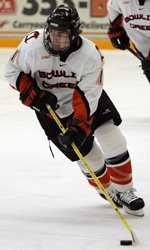At the start of the 2005-06 season, I feared the worst for Bowling Green. After watching the team rally around senior goaltender Jordan Sigalet, who had been diagnosed with multiple sclerosis, the year before, I thought that the Falcons might struggle a little for identity last year.
Sometimes, I hate being right.
The Falcons went from ninth place in the CCHA in 2003-04, to fifth at the end of the following season, Sigalet’s senior year … to last place last season. Of course, it wasn’t just a team identity that was missing; it was Sigalet himself, and his level of play.
“We scored a lot of goals last year, but we could not keep them out of our goal,” said BGSU head coach Scott Paluch. “That’s our biggest challenge as we enter.”
Incumbent goaltender Jimmy Spratt, a freshman last year, returns to the top position in net, according to Paluch, in spite of having the lowest save percentage of any returning CCHA netminder (.855).
“I think after a little bit of a tough start in terms of numbers, [Spratt] worked extremely hard to get himself back to a form that gave us an opportunity to win games,” said Paluch.
Readiness
It would be an injustice to blame BGSU’s poor 2005-06 season solely on Spratt; the kid had plenty of help, and he wasn’t alone in net. Senior Jon Horrell kept Spratt company between the pipes, and there was a defensive corps — allegedly — in front of the Bowling Green net.
But it wouldn’t be fair to blame the Falcon goaltending and defense for last year’s 18 league losses. Last year’s BGSU forwards are equally guilty.
Yes, the guys who scored were often the guys who also turned the puck over, leading to many an opponent opportunity with an underprepared defense and a surprised goaltender.
“There’s no question that turnovers and poor puck protection hurt our overall team defense,” said Paluch, who added that sometimes when things aren’t going right for a team, forwards will “grip the stick” and try to become heroes, “trying to save the game by themselves.”

“This isn’t an individual effort,” said Paluch.
Nor an individual lack of effort.
Resilience
Like Western Michigan, the Falcons need to show a little bounce back this season — okay, a lot of bounce back — this season.
How long will Paluch be given in Bowling Green if the Falcons don’t begin to produce?
Reality
The Falcons offense is fast and can score. Jonathan Matsumoto is one of the top forwards in the country … when he’s bearing down to score. He and the rest of the Falcons need to protect the puck better, remember what Paluch said about hockey being a team sport, and ultimately play better team defense, team hockey.
Paluch is a genuinely nice guy who prides himself on instilling in his team a good work ethic. That’s been his mantra since returning to his alma mater in four years ago, and this, his fifth season, will tell whether his strategies will bear fruit.
He is, as always, optimistic about the strides the Falcons are making, and about their potential for this season — including the potential to improve defensively.
“Six members of our defense last year who played a lot of hockey are back,” said Paluch. “We need to be a better defensive team, and I think we’re up to that challenge.
“I think we’re taking a tremendous motivation from last year. We didn’t finish the season off very well … that’s been a great source of motivation for this year’s group, to make amends for that.”
Erasing the memory of a bad season can be good motivation, but only if the players themselves remember how they hit rock bottom.


